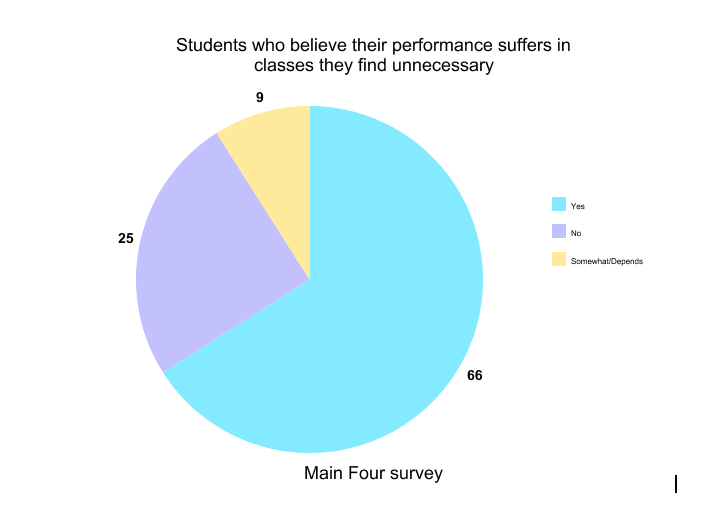When am I going to use this in real life?
You’re sitting in a cheap, wobbly, plastic chair under the harsh fluorescent lights that not only serve as illumination, but also as a reminder of the scarcity of windows in the bland prison you find yourself confined in several hours a day. It’s fourth hour, right in the thick of the school day, and your attention is waning. The teacher is halfway through the lesson and you can barely suppress the words you’ve thought so many times: when are we going to use this in real life?
In a survey conducted by The Main Four, 81% of students surveyed believe that their opinion on the necessity of a class impacts their performance. 66% of students surveyed believed that if they found a class unnecessary or useless in “real life,” their performance suffers in that class. Some of these students expressed that taking these classes were a waste of their time or they simply didn’t care. Although there is a small chance of using everything you’re taught in high school in your future, some things that might not be applicable are beneficial to know.
Social studies teacher Mr. Gregory Talberg explained that knowing how the U.S. government works might not be necessary, but it’s something that it wouldn’t hurt to know.
“Sometimes [students] are right; however, sometimes they don’t know how things might apply to ‘real life’. Some of the things that aren’t applicable, this is the only time you’ll ever learn them,” Mr. Talberg says.
There seems to be a disconnect between the things that are being taught and the students understanding that it could help them in the future. In the survey, 73% of students said they planned on going to college or vocational school. However, much of the information taught in classes that students may find unnecessary now is needed when they continue their education.
Currently attending Michigan State University studying Media and Information, 2015 Howell High School graduate Hunter Carlson has already needed to use things he was taught years ago to aid him in his studies.
“Math is required in college and Algebra II is a part of it. [There is also] photography because it is part of my degree requirements to know about graphic design,” Carlson says.
If the information students are taught is needed even directly out of high school, how does this disinterested thinking arise? The reliance on tests and grades could be a contributing factor. When an educational system is focused on a quantitative value such as a grade, the qualitative aspect can get lost in translation. It is no longer about what the students know, it is about how many points they earn. Students don’t want to or have time to study in-depth and fully grasp lessons that won’t be taken as a grade. Regardless of whether or not the information is on a test that the teachers give, teachers have information that they are required to teach.
 “The fact that we focus so much on test scores in a lot of ways makes it hard for us to teach. [The students think] if it’s not on the test, why learn it?” Mr. Talberg says.
“The fact that we focus so much on test scores in a lot of ways makes it hard for us to teach. [The students think] if it’s not on the test, why learn it?” Mr. Talberg says.
The increase in social media exposure may also be a contributor. To many, school is not as interesting as social media. Posting a photo on Instagram and receiving dozens of likes is far more thrilling than Y=mx+b.
“They’re not stimulated enough in class,” English and Drama teacher Mrs. Jennifer Sebestyen says. “All of that stimulation social media offers…the shock value, it’s all so enticing and inviting.”
Classes might not be interesting enough to capture and hold the attention of buzzing teen minds. With phones in hand, almost every student has access to apps or sites that are either more intriguing or are something that they think will benefit them in the future.
“Because of this stimulation, [students] ask, ‘why do I need to know this? How am I going to benefit?’” Mrs. Sebestyen says.
Students are required to take classes that don’t apply to what field they plan on pursuing in the future. There are a certain amount of credits required in each subject required for graduation, and there are required classes for graduating college as well. In the survey, 47.8% of students surveyed found mandatory classes unfair, 40.3% found mandatory classes fair, and the remaining 11.9% said it depends on the situation. Teachers want students to realize that just because they aren’t pursuing a future in a certain field, gaining this knowledge does not hurt them.
“Education isn’t just about getting a job, it’s about learning about the world,” Mr.Talberg says.
From using mediums like social media to trying to lecture less or making things seem as relevant and important as they truly are, teachers are fighting to keep their students’ attention and show them that what they’re learning is worth it.
“We have to communicate with these kids that they’re better off with this knowledge,” Mrs. Sebestyen says.
But despite efforts taken by teachers to make the information more exciting to learn, a high school education is a joint effort.
“It’s frustrating,” Mr. Talberg says. “ I wonder what I could do differently, [but] often times it’s up to the kids.”
The general theme was to get as much as possible out of high school before you move onto college, the education many high schoolers believe is more important than high school. However, high school is where one lays the foundation for classes taken later on.
“[If I could go back] I would complete every assignment assigned to me to the best of my ability. Not for the grades, but for the knowledge you learn from the activity,” Carlson says.





